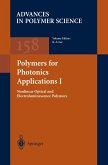The two special volumes of Advances in Polymer Science entitled Polymers for Photonics Applications provide authoritative and critical reviews of up-to-date research and advances in various fields of photonic polymers as well as their promising applications. Eight articles contributed by internationally recognized scientists are concerned with polymers for second- and third-order nonlinear optics, quadratic parametric interactions in polymer waveguides, electroluminescent polymers for light sources, photoreflective polymers for holographic information storage, and highly efficient two-photon absorbing organics and polymers, including their applications. This review should provide individuals working in the field of photonic polymers with invaluable scientific knowledge on the state of the art while giving directions for future research to those deeply interested.
The future of information technology requires ultra high speed processing and large data storage capacity. Since the electronics technology using semi conduc tors and inorganic materials is about to reach its limits, much current research is focused on utilizing much faster photons than electrons, namely photonics. To achieve any significant effect on the actual use of the science of photonics, devel opments of more efficient photonics materials, better optical property evaluations, manufacture of devices for system applications, etc. are the subjects which need to be explored. In particular, the development of photonics materials stands in the forefront of research as this constitutes the most pertinent factor with regard to the development of ultra high speed and large capacity information processing. In this respect, there has been continuous research on photo responsive materials through molecular structure design and architecture and the results so far are very promising as functions and performances are beginning to realize their high expectations. The two special volumes "Polymers for Photonics Applications" give authorita tive and critical reviews on up to date activities in various fields of photonic poly mers including their promising applications. Seven articles have been contributed by internationally recognized and they deal with, polymers for second and third order nonlinear optics, quadratic parametric interactions in polymer waveguides, electroluminescent polymers as light sources, photoreflective polymers for holo graphic information storage, and highly efficient two photon absorbing organics and polymers.
The future of information technology requires ultra high speed processing and large data storage capacity. Since the electronics technology using semi conduc tors and inorganic materials is about to reach its limits, much current research is focused on utilizing much faster photons than electrons, namely photonics. To achieve any significant effect on the actual use of the science of photonics, devel opments of more efficient photonics materials, better optical property evaluations, manufacture of devices for system applications, etc. are the subjects which need to be explored. In particular, the development of photonics materials stands in the forefront of research as this constitutes the most pertinent factor with regard to the development of ultra high speed and large capacity information processing. In this respect, there has been continuous research on photo responsive materials through molecular structure design and architecture and the results so far are very promising as functions and performances are beginning to realize their high expectations. The two special volumes "Polymers for Photonics Applications" give authorita tive and critical reviews on up to date activities in various fields of photonic poly mers including their promising applications. Seven articles have been contributed by internationally recognized and they deal with, polymers for second and third order nonlinear optics, quadratic parametric interactions in polymer waveguides, electroluminescent polymers as light sources, photoreflective polymers for holo graphic information storage, and highly efficient two photon absorbing organics and polymers.
"These topics nicely compliment Volume 1 on NLO materials and devices. The authors do a good job defining the concepts to those new to the field. The author succeeds at describing the basic principles as well as the current challenges in the field. The book is superbly organized and the information is clearly presented in great detail. It would be useful not only for advanced undergraduate classes and graduate courses, but also for self study and is very highly recommended." P0LYMERNEWS
Praise for K.S. Lee's Advances in Polymer Science
P0LYMERNEWS
"These topics nicely compliment Volume 1 on NLO materials and devices. The authors do a good job defining the concepts to those new to the field. The author succeeds at describing the basic principles as well as the current challenges in the field. The book is superbly organized and the information is clearly presented in great detail. It would be useful not only for advanced undergraduate classes and graduate courses, but also for self study and is very highly recommended."
P0LYMERNEWS
"These topics nicely compliment Volume 1 on NLO materials and devices. The authors do a good job defining the concepts to those new to the field. The author succeeds at describing the basic principles as well as the current challenges in the field. The book is superbly organized and the information is clearly presented in great detail. It would be useful not only for advanced undergraduate classes and graduate courses, but also for self study and is very highly recommended."









